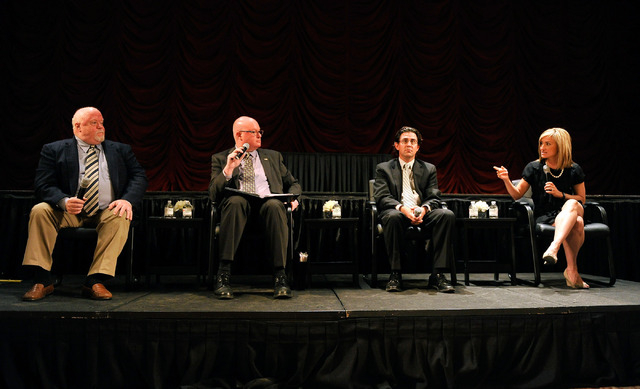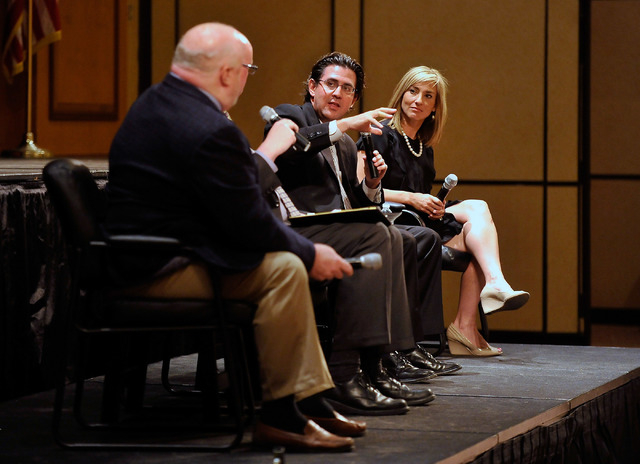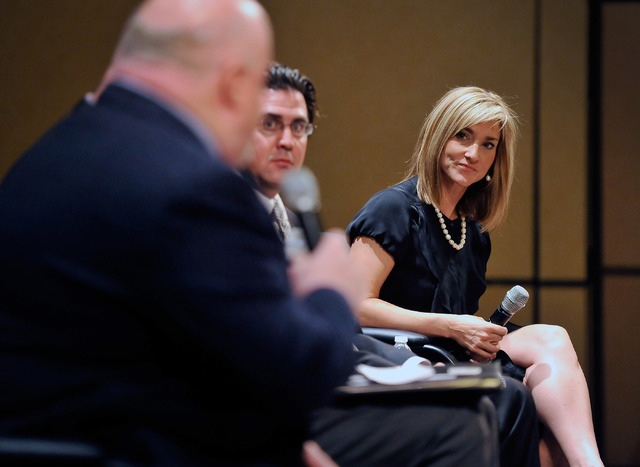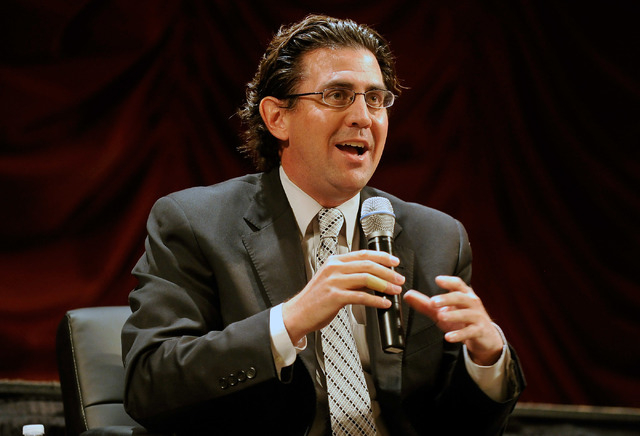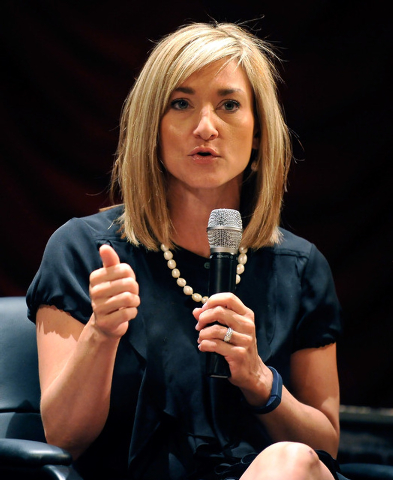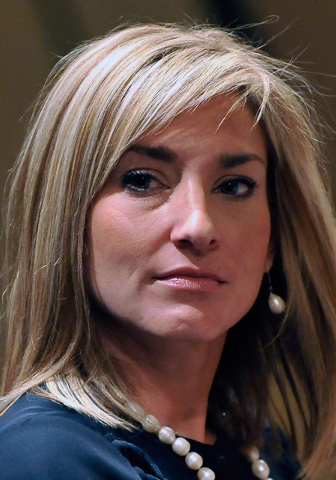Panel: Nevada margins tax proposal leaves many unanswered questions
If Nevada voters approve a proposed 2 percent margins tax on business in November, there will be a lot of uncertainty about which companies will be taxed and whether the $750 million annual revenue raised will really be used to increase education funding, said experts who debated the ballot question in Las Vegas on Monday.
“The devil is always in the details,” Jeremy Aguero of Applied Analysis said.
Aguero, who has done studies for proponents and opponents, said it’s unclear, for example, how “pass through” revenue would be taxed. A general contractor who wins a $1 million job and spends $800,000 to hire subcontractors to do the work may or may not be taxed on the full amount — even if the subcontractors are taxed on their revenue — Aguero said.
“This is not entirely clear,” he said. “There will probably be some court cases.”
He said the construction and housing industries, where money is passed between brokers and real estate firms, are complicated when it comes to determining actual revenue, and the proposed Nevada margins tax doesn’t provide guidance.
In contrast, the Texas franchise tax — the model for Nevada’s proposed margins tax — says brokers don’t have to pay the tax, and the law also provides a “carve out” for general contractors working with subcontractors, Aguero said.
The Nevada Tax Department will have to write regulations to administer the proposed 2 percent margins tax if it passes, he said, and that could take some time. Aguero expects court challenges at any rate to sort out complications.
“The regulatory process is going to be incredibly difficult,” partly because each company is so different, he said.
Aguero said it’s likely that all businesses will have to file some sort of tax return to the state whether or not they must pay the tax, which will be levied against companies making $1 million or more in annual revenue.
Even companies that don’t make a profit must pay the proposed margins tax, which opponents say could close small or struggling businesses and cost up to 9,000 jobs, according to a preliminary estimate by Aguero.
“It’s going to kill jobs and it’s going to damage our economy,” said Karen Griffin, spokeswoman for The Coalition to Defeat the Margins Tax Initiative, which is supported by the gaming and mining industries and the Las Vegas Metro Chamber of Commerce, among others.
Griffin also said that some Nevada businesses seeking to expand or companies considering relocating to the Silver State are holding off until they see whether the state approves a margins tax on business. She said, if approved, it would give Nevada the fourth or fifth highest corporate tax rate in the country, the equivalent of 14 to 15 percent.
But Dan Hart, spokesman for the proponents of the margins tax, argued it’s time for the business community to contribute more to fund education in the state, which is at or near the bottom of most rankings, including graduation rates.
“If we’re going to fund schools, we’re going to have to pay for it,” Hart said. “And I think it’s appropriate for the business community to do that.”
Hart said some companies are deciding not to come to Nevada because of the poor education system, which he argued is hurting the state’s overall economic development efforts.
Now, Nevada taxes the gaming and mining industries and has a payroll tax, which has been extended two times.
Hart and Griffin debated the issue at the Las Vegas Review-Journal’s latest “Hashtags & Headlines” event, held at Texas Station. About 60 people, including business and education leaders, attended the luncheon, which was moderated by Review-Journal columnist Steve Sebelius. Aguero also was on the panel to talk about his research.
The margins tax, which is called the “Education Initiative,” will be Question 3 on the Nov. 3 general election ballot. It was proposed by the Nevada State Education Association, the teachers union, which was frustrated with what educators said is a lack of action by the Nevada Legislature and Gov. Brian Sandoval to adequately fund education.
Although the initiative says the margins tax revenue collected will go into Nevada’s Distributive School Account, there’s no guarantee it will result in an increase in education funding. That’s because the governor’s budget and the Legislature could reduce overall general fund contributions to the school account — possibly equal to any new tax collections.
If history is any guide, that’s what would happen, according to Aguero. He said that since the 1950s, when Nevada first imposed a sales tax to fund education, such revenue has ended up being diverted for other uses. As recently as 2009, the Legislature approved a room tax hike for education, but the new revenue never went to pay for schools.
“There are no guarantees and our history sort of points to the idea that locking up any money for education is pretty tough to do,” Aguero said.
Hart acknowledged the problem, but said previous court rulings prevented the Education Initiative from requiring the Legislature to spend the money on education; it could only say the revenue would flow into the school account. Still, he said lawmakers would be “hard-pressed to reduce funding for education” if voters approve the initiative.
Asked whether he thinks the Legislature will boost education funding if the initiative fails, Hart said no.
“It’s unlikely that we’re going to see any sort of revenue enhancement out of the Legislature should the Education Initiative fail,” he said, noting any proposed tax increase needs a two-thirds vote to pass.
Griffin, speaking for the business community, said she believes company leaders will step forward to ensure education is “adequately funded,” in the future, although she stopped short of saying it’s underfunded now.
“I would certainly hope that the Legislature would step up and do what needs to be done,” Griffin added.
Hart interjected, “It just doesn’t happen and that’s why we are where we are now.”
Contact Laura Myers at lmyers@reviewjournal.com or 702-387-2919. Find her on Twitter: @lmyerslvrj.








